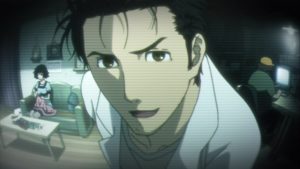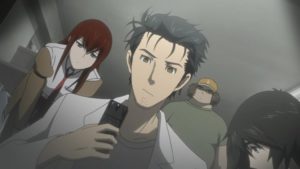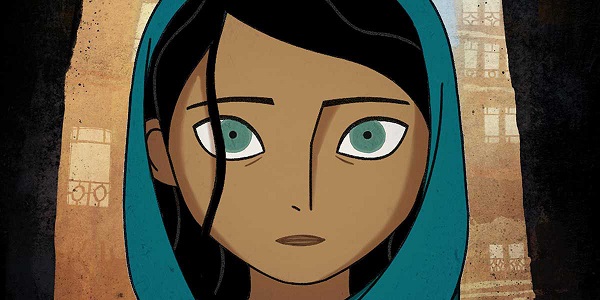What would a person do if given the foreknowledge of things to come, and the ability to change the present and future as he sees fit? In Steins Gate, protagonist Okabe and his friends wrestle with such a power, and each hopes to change their own lives. Each character provides a different answer to the same question.
 With the ability to send these text messages, called D-mails, into the past, some of the lab members send texts to change their current lives, with the exception of Kurisu. When asked if she would like to change any events in her past, she says, “I’ve only lived 18 years, but I don’t want to change any of them. They’re all part of my life, even the failures.” Unlike everyone else, she finds her current identity and past experiences as inseparable. She highlights the benefits of past failures and trials in life by accepting them because of the personal growth that she has obtained through those experiences. Indeed, she is currently a brilliant scientist because of her ongoing conflict to gain the acceptance of her father. This conflict is central to her identity, personality, and career. And she accepts all of it, unlike her labmates.
With the ability to send these text messages, called D-mails, into the past, some of the lab members send texts to change their current lives, with the exception of Kurisu. When asked if she would like to change any events in her past, she says, “I’ve only lived 18 years, but I don’t want to change any of them. They’re all part of my life, even the failures.” Unlike everyone else, she finds her current identity and past experiences as inseparable. She highlights the benefits of past failures and trials in life by accepting them because of the personal growth that she has obtained through those experiences. Indeed, she is currently a brilliant scientist because of her ongoing conflict to gain the acceptance of her father. This conflict is central to her identity, personality, and career. And she accepts all of it, unlike her labmates.
As each lab member changes the past, only Okabe retains his memories with each change in the timeline, and he must determine what changed each time. Looking for answers on how this is happening, Okabe asks John Titor for answers. Titor, who claims to be a time traveler from a future torn apart by World War III, believes Okabe can save the future from dystopia with this ability if he can change the past enough. This distant future seems so unlikely given the current state of the world. However, the dystopian future comes crashing into the lab in the form of Moeka and some armed individuals from the Société Européenne de Recherche Nucléaire (SERN) organization to capture Okabe and his research, and in the process, sweet and innocent Mayuri is killed.
Okabe is narrowly able to go back in time a few hours to flee the raid before it happens and to save Mayuri’s life. He finds her and tries to take her elsewhere in the city to safety, but again she is killed. So he goes back in time again. Again she is killed. And again, and again. Okabe is distraught over his inability to save his friend, and explains to Kurisu, who has no memory of these events taking place, that he has seen Mayuri die dozens of times. Even the attempts he is able to save her from SERN soldiers, she still dies in other ways, such as her friend accidentally falling and pushing her into a train. Fate itself has determined that Mayuri must die at an appointed time, it seems.
 As he despairs at his own failures, he says, “Even though I know everything, I’m powerless.” In doing so, he highlights the limits of human power. He has obtained what could be considered the greatest technological advancement ever discovered, the power to change history, but even in doing so, it was to his own detriment. Okabe resembles Icarus from Greek mythology in this regard. Icarus was to never fly too high or his wax wings would melt, and not too low so his wouldn’t would touch the water. Due to his own hubris, Icarus flew too close to the sun, causing his wings to melt and he fell into the water and drowned. Okabe has shown his hubris constantly when speaking with his friends and lab members, and by experimenting with a power that may be too taboo for humans. Unlike Icarus, Okabe did not die from his own arrogance, but Mayuri died instead.
As he despairs at his own failures, he says, “Even though I know everything, I’m powerless.” In doing so, he highlights the limits of human power. He has obtained what could be considered the greatest technological advancement ever discovered, the power to change history, but even in doing so, it was to his own detriment. Okabe resembles Icarus from Greek mythology in this regard. Icarus was to never fly too high or his wax wings would melt, and not too low so his wouldn’t would touch the water. Due to his own hubris, Icarus flew too close to the sun, causing his wings to melt and he fell into the water and drowned. Okabe has shown his hubris constantly when speaking with his friends and lab members, and by experimenting with a power that may be too taboo for humans. Unlike Icarus, Okabe did not die from his own arrogance, but Mayuri died instead.
Okabe soon realizes that the only way to save Mayuri, and prevent World War III, is to undo all of the changes made by Ruka, Faris, and Moeka. The lab members each desired to change something about themselves and use the power of the time machine to secure those desires. Ruka wanted to be born a female. Faris wanted to prevent her father’s death. Moeka wanted approval from the mysterious person known to her as “FB.” Some of these requests are innocuous enough. However, it was undoing Faris’s wish of saving her father’s life that highlights another moral dilemma. Why should Faris’s father die so that Mayuri should live? These are two completely unrelated deaths, but with the power of the time machine, we see fate presenting the choice to Okabe that only one can live. Given the foreknowledge of events, and the power to choose in which future they should live, Okabe is given a choice not afforded to normal life. He chooses to press on and save Mayuri and convince Faris to undo her D-mail. This is in part because of the threat of World War 3, which justifies Okabe’s decision.
 But what if World War III was not a threat? Would it then be possible to use the power of time travel for any greater good, or would every choice made be just as selfish as we have seen so far by every character who uses the time machine? If any of us were to suddenly gain this same knowledge and power, how can we be sure we would not act just as selfishly? When the lab members wanted to verify that the machine worked, their first test was to attempt to win the lottery, which may be the prime example of how any person with foreknowledge would behave. One simple bit of knowledge, just a few numbers, is all that stands between a person and an easier life.
But what if World War III was not a threat? Would it then be possible to use the power of time travel for any greater good, or would every choice made be just as selfish as we have seen so far by every character who uses the time machine? If any of us were to suddenly gain this same knowledge and power, how can we be sure we would not act just as selfishly? When the lab members wanted to verify that the machine worked, their first test was to attempt to win the lottery, which may be the prime example of how any person with foreknowledge would behave. One simple bit of knowledge, just a few numbers, is all that stands between a person and an easier life.
One of the best questions raised by science fiction is the simple and powerful “What if?” What if some ability or technology was accessible to us? What would the world look like? For Okabe, he used this new found power to save his friends as well as the world. While extraordinary, this may be all any of us would do as well, even if we tried to win the lottery first.


